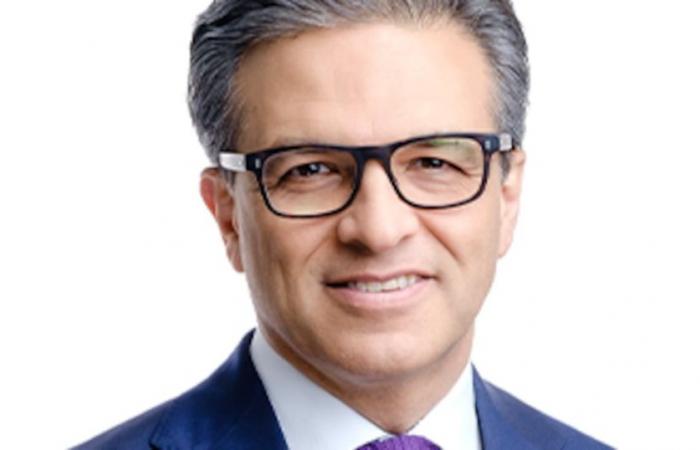
The leader of the Canadian businessmen, Goldy Hyder, will begin from Monday his first visit to Chile, with the focus is to increase investments and further improve relations between the two countries.
Hyder is the president and CEO of the Business Council of Canada, an organization formed by the presidents, general managers and entrepreneurs of the most important companies in that country, representing all the items.
Canada is the main foreign investor in Chile (with more than US $ 40 billion in 2024 according to data from the Subbrei), with companies in the mining, financial, energy and others. For this reason, Hyder’s visit, organized by the Chilean Canadian Chamber, the embassies of both countries and Investchile, will have a high -level agenda, with meetings with the Ministers of Finance, Energy, Public Works, Foreign Ministry and Economics, in addition to Codelco, the CPC, and the main representatives of the Canadian companies in Chile. He will even have a breakfast about the national economic context, in which the Macroeconomic Coordinator of Finance and Jorge Selaive, chief economist of Canadian Scotiabank will participate.
What is the purpose of your visit?
-These things go through relationships and opportunities. Chileans have an excellent ambassador here in Canada, Chile has been organizing a Chileday every year here and I have attended a couple of them. I have met with the Minister of Economy and others, and have presented very solid and convincing arguments about opportunities in Chile, but also about bilateral opportunities, because it is a double -meaning street. We had the opportunity to meet with some of the ministers at the last PDAC mining conference, which is the greatest in the world and there I was invited (to Chile). We work, of course, with our counterparts in the cameras and others to say, how we will be able to achieve business relationships, but also business relations to government, because whenever you are entering a new country it is important to know the policy, the political environment in which companies are entering and the long term, long -term stability.
Especially if uncertainty has increased worldwide …
-In a moment of tremendous uncertainty, one of the things that offers some certainty or some more predictability are the countries with which we have trade agreements. And that is the benefit that Canada and Chile are in the CPPPP: that the rules are established, the structures are established, the processes are established. We can move with confidence in what happens in the case of a dispute or we know what tariff policies are going to be a moment of tremendous uncertainty.
And what are your expectations about this visit?
-Well, first, I want to learn more about what is happening in Chile. This is not new for many of our Canadian members who are already investing in Chile and have been there for a long time. But, from the point of view of mining, engineering and infrastructure, there are opportunities to invest in Chile and collaborate with the business community of that country and create beneficial situations for all.
How do you see the status of Canadian investment in Chile today?
-It’s very positive. Canada is the first foreign investor in Chile, and Chile is Canada’s first investment destination in Latin America. We have about 10 Canadian companies there making large investments and operations. But the reality is that the potential is much, much greater than where we are today.
What is needed for this potential to become reality?
-A of the most common things that I hear from business leaders are the continuous challenges around normative predictability, and the speed with which these processes can move. If you have a mine, and it takes 10 to 15 years to access that mine, during all that time the company is investing money from shareholders, which I remind people who are money from other people. It does not belong to the company, it is the money of the shareholders. Most of the time it is money from people who are in pension or others, who are investing in the stock market. So we have to be very responsible when displaying that capital. If someone says that in 15 years I will tell you if you can get a permit or not, or if you can extract the resources, it is too much time. And the money goes where money grows, and where it is welcome. And let me be clear, I say the same things about my own country, this is not in any way accuse Chile. We are fighting the same battle here in Canada: the regulations are becoming too complex, too many things are accumulating. And it is delaying the ability to deploy capital, create jobs and help grow the economy. So we need stability, predictability and reliability in those norms and regulations.
And in what sector do you see more opportunities in Chile?
-All the world knows that critical minerals are the hottest issue in today’s world. In terms of copper, lithium, we have both technology, technological resources there. Our pension funds are very active and are trying to do more, along with some of our crown corporations such as Export Development Canada. We also have technological companies. And I would also mention infrastructure.
What impact do you see of possible US tariffs for Canadian companies, especially for companies in the mining sector?
-Are to come three days in Washington. The lens with which Americans look at things is effectively that of economic security, and national security. And thus the key to any type of economic and national security will be critical minerals. The ability to have reliable access to essential minerals will greatly contribute to developing economic and national security. That is the offer we are doing as Canada. We have many of those resources, you have many resources working together, we can develop, extract them safely, responsible, and make sure they are available for others who need them and do not have them. On tariffs, this will be solved alone. It will take some time. It can be in the next 100 days, it can be in the next year, but in the end it will resolve by itself. My conjecture is that Americans will end up with some type of VAT, which is effectively what is a tariff. And we all know that other countries are not paid, the Americans are paid and they will end up paying them.





